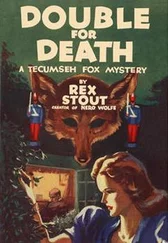Rex Stout - Death of a Doxy (Crime Line)
Здесь есть возможность читать онлайн «Rex Stout - Death of a Doxy (Crime Line)» весь текст электронной книги совершенно бесплатно (целиком полную версию без сокращений). В некоторых случаях можно слушать аудио, скачать через торрент в формате fb2 и присутствует краткое содержание. Жанр: Старинная литература, en-GB. Описание произведения, (предисловие) а так же отзывы посетителей доступны на портале библиотеки ЛибКат.
- Название:Death of a Doxy (Crime Line)
- Автор:
- Жанр:
- Год:неизвестен
- ISBN:нет данных
- Рейтинг книги:4 / 5. Голосов: 1
-
Избранное:Добавить в избранное
- Отзывы:
-
Ваша оценка:
- 80
- 1
- 2
- 3
- 4
- 5
Death of a Doxy (Crime Line): краткое содержание, описание и аннотация
Предлагаем к чтению аннотацию, описание, краткое содержание или предисловие (зависит от того, что написал сам автор книги «Death of a Doxy (Crime Line)»). Если вы не нашли необходимую информацию о книге — напишите в комментариях, мы постараемся отыскать её.
Death of a Doxy (Crime Line) — читать онлайн бесплатно полную книгу (весь текст) целиком
Ниже представлен текст книги, разбитый по страницам. Система сохранения места последней прочитанной страницы, позволяет с удобством читать онлайн бесплатно книгу «Death of a Doxy (Crime Line)», без необходимости каждый раз заново искать на чём Вы остановились. Поставьте закладку, и сможете в любой момент перейти на страницу, на которой закончили чтение.
Интервал:
Закладка:
Rex Stout
Death of A Doxy
Introduction
The world is much changed since the first Nero Wolfe mystery was published in 1934. We recovered from the Great Depression, fought a World War, eradicated polio, engaged in another, colder war, invented rock music, and put a man on the moon. We became hip, struggled to include the disenfranchised, marched for peace, and learned, painfully, that we – and our leaders – sometimes had feet of clay. It is remarkable that for four decades Rex Stout was able to craft and sustain his series in the midst of this whirlwind of change, his readership growing each year. Even after Stout's death in 1975 readers haunted bookstores in hopes of a continuation of the chronicles of those inhabiting the old brownstone on West Thirty-fifth Street. The appeal is broader than mere nostalgia. Stout's perception of human nature (and, by extension, Wolfe's) is closer to the mark at times than all our pop psychology. The plots are serpentine enough for the most cerebral reader. And there is action when action is required, not gratuitous but, as Wolfe would say, satisfactory.
Granted, some of Archie's expressions now seem a little dated; no one refers to women as doxies anymore. (In fact, the lines between those women and us have faded and all but disappeared.) If the series is to be criticized at all, it seems most likely that it would, in our atmosphere of political correctness, be accused of blatant sexism. Wolfe's attitude toward women, after all, is quite clear. He is uncomfortable with them. He doesn't trust them: "When [women] stick to the vocations for which they are best adapted, such as chicanery, sophistry, self-advertisement, cajolery, mystification, and incubation, they are sometimes superb creatures." Yet, and this is fascinating, Wolfe's reaction to Julie Jaquette in Death of a Doxy demonstrates anything but sexism.
Death of a Doxy is, on the one hand, classic Nero Wolfe. Orrie Cather, occasional legman for the great detective, is in hot water. Orrie is being held for the murder of Isabel Kerr, a showgirl he has been seeing, and Wolfe, viewing it as a personal obligation, takes the case, albeit reluctantly. The water is muddied by evidence that the woman was attempting to blackmail Orrie with proof of their trysts. Additionally, Isabel's sister, Stella Fleming, seems more interested in avoiding scandal than in seeing her sister's killer brought to justice.
On the other hand, it is with Julie Jaquette, Isabel's best friend, that we observe a rare phenomenon. At the conclusion of their initial interview, Wolfe says, "I have the impression that your opinion of our fellow beings and their qualities is somewhat similar to mine." And then he does something almost unprecedented in the Stout oeuvre: "He got to his feet. He almost never stands for comers or goers, male or female. And he actually repeated it. 'I wish you well, madam.'" From Wolfe, this is more than a compliment; it is a lavish tribute. Later, when Julie's life is threatened and she takes refuge in the old brownstone, she spends two hours with Wolfe in the plant rooms among the orchids. Need it be said that Stout is subtle, that orchids have long been held as a symbol of sexuality, that the image of Wolfe and Julie Jaquette in the hot, humid plant rooms for two hours with all that rich dark soil and all those orchids is particularly evocative? And when she comes down she is calling him Nero ! Of course, nothing happened, because later Julie complains to Wolfe, "You get on my nerves because you haven't got any." Or did it happen on a purely subliminal level, the kind of seduction, after all, to which Wolfe would be most susceptible? And did he later rebuff her? This is not the misogynistic Nero Wolfe we've come to know and love.
It is clear that what Nero Wolfe is afraid of concerning women is in himself. Wolfe says in Over My Dead Body , "I used to be idiotically romantic. I still am, but I've got it in hand." And later in the same book, "I have skedaddled, physically, once in my life, from one person, and that was a Montenegrin woman." In Too Many Cooks he says, "Not like women? They are astounding and successful animals. For reasons of convenience, I merely preserve an appearance of immunity which I developed some years ago under the pressure of necessity." If Wolfe has issues with members of the opposite sex, isn't he, in this regard at least, little different from most of us? That he takes his fear to the extreme of an aversion is merely consistent with his grandiose nature, and that he can state the reasons for this aversion strongly and literately is not, de facto, sexism. We, however, from our superior perspective of 1995 enlightenment, can recognize his foolish position for what it is, for we ourselves are above it, right? Speak up, I can't hear you!
In any event, if you've read Death of a Doxy before, welcome back. If not, you're in for a treat. As Nero says, I wish you well.
–Sandra West Prowell
Chapter 1
I stood and sent my eyes around. It's just routine, when leaving a place where you aren't supposed to be, to consider if and where you have touched things, but that time it went beyond mere routine. I made certain. There were plenty of things in the room – fancy chairs, a marble fireplace without a fire, a de luxe television console, a coffee table in front of a big couch with a collection of magazines, and so forth. Deciding I had touched nothing, I turned and stepped back into the bedroom. Nearly everything there was too soft to take a fingerprint – the wall-to-wall carpet, the pink coverlet on the king-size bed, the upholstered chairs, the pink satin fronts on the three pieces of furniture. I crossed for another look at the body of a woman on the floor a couple of feet from the bed, on its back with the legs spread out and one arm bent. I hadn't had to touch it to check that it was just a body or to see the big dent in the skull, but was there one chance in a million that I had put fingers on the heavy marble ashtray lying there? The butts and ashes that had been in it were scattered around, and it was a good bet that it had made the dent in the skull. I shook my head; I couldn't possibly have been such an ape.
I left. Of course I had to use my handkerchief on the doorknob, inside and outside, and I used a knuckle on the button that summoned the do-it-yourself elevator, and also, in the elevator, on the 1 button. I dabbed the 4 button, which I had pushed coming in, with my handkerchief. There was no one in the little lobby down below, and since I had been gloved when I entered I didn't have to bother about the knobs of the outside door. As I headed west, toward Lexington Avenue, I turned up my overcoat collar and put my gloves on. It was the coldest day of the winter, with a gusty wind.
I don't try to do any hard thinking while I'm walking, you bump into people, but anyway it didn't even call for guessing, let alone thinking. What was needed was asking, and the person to ask lived on the second floor of a walkup on 52nd Street between Eighth and Ninth Avenues. Since this was 39th Street, thirteen short blocks up and four long blocks crosstown. My watch said 4:36. Getting a taxi at that time of day is a career, and there was no hurry. He was on a job. I walked.
It was one minute to five when I entered a phone booth in a bar and grill on Eighth Avenue and dialed a number. When Fritz answered I asked him to buzz the plant rooms, and after a wait a growl came: "Yes?"
"Me," I said. "I've run into a snag on this personal errand and I don't know when I'll be back. Probably not in time for dinner."
Читать дальшеИнтервал:
Закладка:
Похожие книги на «Death of a Doxy (Crime Line)»
Представляем Вашему вниманию похожие книги на «Death of a Doxy (Crime Line)» списком для выбора. Мы отобрали схожую по названию и смыслу литературу в надежде предоставить читателям больше вариантов отыскать новые, интересные, ещё непрочитанные произведения.
Обсуждение, отзывы о книге «Death of a Doxy (Crime Line)» и просто собственные мнения читателей. Оставьте ваши комментарии, напишите, что Вы думаете о произведении, его смысле или главных героях. Укажите что конкретно понравилось, а что нет, и почему Вы так считаете.












